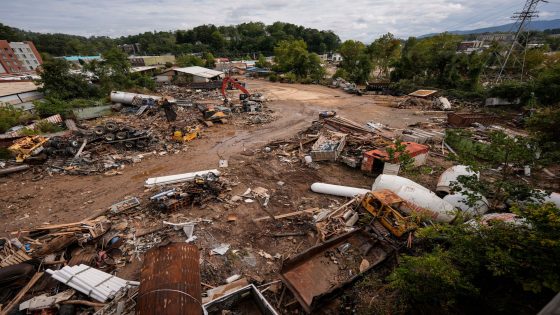Crews have airlifted emergency food and water into remote North Carolina towns that were cut off and devastated as tropical storm Helene turned the western part of the state into a “post-apocalyptic” landscape.
A hurricane when it slammed into the Florida Gulf coast on Thursday, Helene tore a destructive path through southeastern US states, ripping up roads, tossing homes about and severing lines of communication.
The storm killed more than 100 people in North Carolina, South Carolina, Georgia, Florida, Tennessee and Virginia.
The death toll is expected to rise once rescue teams reach isolated towns and emergency telecommunications assets come online.
Throughout North Carolina, some 300 roads were closed, more than 7,000 people have registered for United States Federal Emergency Management Agency assistance, and the National Guard was flying 1,000 tonnes of food and water to remote areas by plane and helicopter, officials told a news briefing.
Among the demolished towns was the tiny hamlet of Bat Cave, about 100 miles (160km) west of Charlotte, where the Broad River – in what climate scientists called a 1,000-year event – rose to unprecedented levels, washed away homes and broke through the town bridge.
The US government, states and localities are engaged in a massive recovery effort throughout the southeast.
People were stranded without running water and 1.8 million homes and businesses remained without power on Monday, according to the website Poweroutage.us.
Georgia Governor Brian Kemp said at least 25 people in his state had died, including a firefighter responding to emergency calls during the storm and a mother and her one-month-old twins who were killed by a falling tree. South Carolina has reported at least 29 dead.
In North Carolina’s mountainous Buncombe County, which includes the tourist destination of Asheville, 40 people died, the county manager said.
North Carolina Governor Roy Cooper took an aerial tour of the damage and said “significant resources” would be needed in the short and long term.
“The devastation was beyond belief, and even when you prepare for something like this, this is something that’s never happened before in western North Carolina. Search and rescue teams are continuing to work,” Cooper told a news briefing.
Some 1,200 federal personnel are on the ground, in addition to state and local responders. The US Army Corps of Engineers is planning major debris removal.





